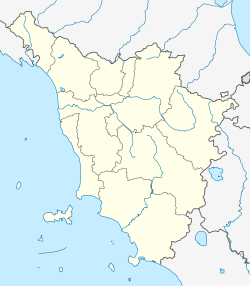Pescaglia
This article possibly contains original research. (November 2007) |
Pescaglia | |
|---|---|
| Comune di Pescaglia | |
 Panorama of Pescaglia | |
| Coordinates: 43°58′N 10°25′E / 43.967°N 10.417°E | |
| Country | Italy |
| Region | Tuscany |
| Province | Lucca (LU) |
| Frazioni | Vetriano, Piegaio, San Rocco in Turrite, Pascoso, Convalle, Gello, Celle dei Puccini, Villa A Roggio, Colognora, Fiano, San Martino in Freddana, Monsagrati, Cerreto |
| Government | |
| • Mayor | Andrea Bonfanti |
| Area | |
| • Total | 70.4 km2 (27.2 sq mi) |
| Elevation | 504 m (1,654 ft) |
| Population | |
| • Total | 3,486 |
| • Density | 50/km2 (130/sq mi) |
| Demonym | Pescaglini |
| Time zone | UTC+1 (CET) |
| • Summer (DST) | UTC+2 (CEST) |
| Postal code | 55064 |
| Dialing code | 0583 |
| Website | Official website |
Pescaglia is a comune (municipality) in the Province of Lucca in the Italian region Tuscany, located about 70 kilometres (43 mi) northwest of Florence and about 15 kilometres (9 mi) northwest of Lucca.
Pescaglia borders the following municipalities: Borgo a Mozzano, Camaiore, Fabbriche di Vallico, Lucca, Stazzema, Fabbriche di Vergemoli.
History[edit]
The name Pescaglia is thought by some to derive from the Latin Pascualia, meaning pastureland, and by others from the verb pescare, meaning "to fish". Both relate to the abundant natural resources of the territory.
While mention of Piscalia or Pascualia exist from Roman times the first specific record of the town is thought to be in documents relative to the ownership of property by the church of San Pietro in Rome dated around the 9th century.
After this documents reveal that large parts of the comune were owned by the Rolandinghi of Lombard origin. These were succeeded by the Antelminellis during the period when Pisa dominated Lucca.
Recorded control of the town and territory was achieved by Lucca in 1272. Instruction to razeoriginal castle was recorded in the Statute of 1308 in order to weaken the local lords. It is questionable if this order was carried out, but in 1584, architect Vincenzo Civitali was instructed to rebuild the castle. Pescaglia remained within control of Lucca from that period to today growing in size and importance.
Geography[edit]
Pescaglia, the town, is found in the geographical centre of the comune and valley of the Pedogna. It is broken into three distinct urban units, Castello del Poggio or simply il Poggio, Piazzanello and Villabuona. Batoni is a hamlet within the comune.[4]
Main sights[edit]
Transport[edit]
Travel within the territory is by road. Each of the three valleys, the Pedogna, the Freddana and the Turrite are served by main roads along the bottom the valley that link to the SS12 which runs from Lucca to Modena. In recent years the improvements to key roads joining the valleys has greatly improved communication across the valleys.
References[edit]
- ^ "Superficie di Comuni Province e Regioni italiane al 9 ottobre 2011". Italian National Institute of Statistics. Retrieved 16 March 2019.
- ^ All demographics and other statistics: Italian statistical institute Istat.
- ^ "Popolazione Residente al 1° Gennaio 2018". Italian National Institute of Statistics. Retrieved 16 March 2019.
- ^ "SIRA - Batoni" (in Italian). Sistema Informativo Regionale Ambientale della Toscana. Retrieved 2008-03-09.
Sources[edit]
- Magi, Giovanni (1987). La Toscana paese per paese. Bonechi.




